The race to replace Zev Yaroslavsky on the Los Angeles County Board of Supervisors is on. Candidates John Duran, Sheila Kuehl, Bobby Shriver and Pamela Conley Ulich are battling to represent the Third District, which includes the wealthy Westside communities of Malibu, Pacific Palisades and Beverly Hills, along with large swaths of the San Fernando Valley. The four debated March 27 at the Los Angeles Press Club‘s Steve Allen Theater in Los Feliz. Hosted by the club and moderated by KPCC contributor Patt Morrison, the debate drew a crowd of journalists and political professionals dressed for the office, sprinkled with more casually clad community members.
Attorney and West Hollywood City Councilman Duran began a round of introductions by describing himself as a “pro-business Democrat” and called attention to his city’s fiscal stability. Former California state Senator Sheila Kuehl emphasized her experience and knowledge of county issues,
» Read more about: L.A. County Supervisor Candidates Debate »



The Passionate Suitcase
I fall out of the door on my way to you, and the passionate
the old one, so many times strapped back together—
comes unstrapped. The leather ties slap at my calves like
tongues. The five silver dollars I got from my uncle for spelling
Mediterranean Sea roll along the ground. I believe the moon
blinks. Once.
I fall out of the door on my way to you one terrible night and the
passionate suitcase unhinges its mouth the way children sob. My
clothes lie in puddles at my feet. Pools of rice, pools of soft
lingerie. Which is more than the traffic of leaving; more than I’d
wanted to kneel, gather up.
I fall out of the door on my way to you with the passionate suitcase
I’ve carried so long flapping its one broken arm in the breeze.


The Language of Health from LAANE on Vimeo.
In California, a state where nearly seven million residents admit to speaking little or no English, having access to a professional interpreter can mean the difference between life and death in hospitals. With so many Californians at daily risk, a new bill would ensure that patients with limited English proficiency receive correct medical treatment. The law, however, will come too late for Guillermo Garcia Rodriguez. In 2011, the then-45-year-old, Oceanside father of three rushed his 42-year-old wife Elizabeth, who had suffered a massive stroke, to Tri-City Medical Center where she was intubated and put on life support.
Talking to Capital & Main through an interpreter, Garcia, who like his wife, speaks no English, describes a bewildering and frightening month-long ordeal in which he could get little information from the mostly non-Spanish-speaking nurses and hospital staff.
» Read more about: The Language of Health: Medical Interpreters Bill Moves Forward »
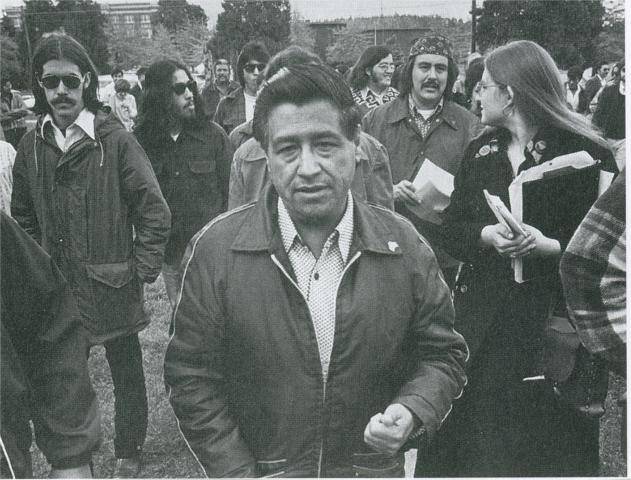
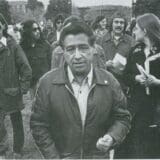
Many people thought Cesar Chavez was crazy to think he could build a union among migrant farmworkers. Since the early 1900s, unions had been trying and failing to organize California’s unskilled agricultural workers. Whether the workers were Anglos, Chinese, Japanese, Filipinos or Mexican Americans, these efforts met the same fate. The organizing drives met fierce opposition and always flopped, vulnerable to growers’ violent tactics and to competition from a seemingly endless supply of other migrant workers desperate for work. So when Chavez left his job as a community organizer in San Jose in 1962 and moved to rural Delano to try, once again, to bring a union to California’s lettuce and grape fields, even his closest friends figured he was delusional.
Within a decade, however, the United Farm Workers (UFW) union had collective bargaining agreements with most of California’s major growers. Pay, working conditions and housing for migrant workers improved significantly.


There haven’t been, to put it mildly, many films about America’s labor movement. Take away Salt of the Earth (1954) and Norma Rae (1979) and what are you left with? Cesar Chavez, then, offers to fill a cavernous void in the public’s knowledge about both union organizing and the history of the country’s mostly Latino agricultural workforce. Directed by the Mexican actor and film producer Diego Luna (Y Tu Mamá También, Elysium), the film follows Chavez (Michael Peña) from the time he parted company with the grassroots Community Service Organization (CSO) to the signing of union contracts with growers following a successful consumer boycott of table grapes.
Working with a screenplay by Keir Pearson, Luna wisely passes on a sweeping Gandhi-style treatment of Chavez’s entire life. This allows Luna and cinematographer Enrique Chediak to linger on the arid poetry of life in California’s Central Valley (played here by Sonora,


When Diego Luna was growing up in Mexico he’d sometimes hear references to Cesar Chavez and the union of farm workers he had organized in America. Luna, who would become one of his country’s leading film stars, remembers being struck as a 13-year-old by television images of Chavez’s funeral – the man was so modest, his coffin was an unpainted wooden box. A few years ago Luna began assembling a production company to film one critical chapter in Chavez’s life – the 10-year period in which he formed the United Farm Workers Organizing Committee and which culminated with the triumph of the consumer grape boycott. Cesar Chavez opens this week and Luna, while in Los Angeles to promote the film, spoke to Capital & Main about the movie, the man and the movement he created.
Capital & Main: Your film is a biography but is there something more behind it?
I think its message is of what we can do when we unite.
» Read more about: Interview With ‘Cesar Chavez’ Director Diego Luna »


Today in Los Angeles attorneys will offer closing arguments in Vergara v. California, a lawsuit funded by Silicon Valley millionaire David Welch and others with ties to the school privatization movement under the banner of a front organization called Students Matter. The suit wrongly attacks as unconstitutional California statutes covering teacher employment, including the current two-year probationary period, the due process protections built into teacher dismissal and layoff procedures that value experience over more arbitrary factors.
That the probationary period is even an issue is a little mind-boggling; if a principal can have a teacher on staff for two years and still have no idea if that teacher is effective, he or she probably has no business being a principal. At trial, award-winning superintendents and principals have testified that two years is more than enough time to decide whether to keep a teacher on staff and,
» Read more about: Vergara Lawsuit Would Hurt California Students »
When Dan Flaming, the president of the Economic Roundtable research group, describes the tanking of the L.A. economy in the 1990s, he pinpoints the cause to the loss of thousands of aerospace jobs. However, he explains, it was only immigrant migration that rescued Los Angeles financially. The skills, hard work and entrepreneurial energy of the estimated 100,000 immigrants who came here each year between 1989 and 2000 fueled an informal, low wage economy that kept the city humming. (See Flaming discuss L.A.’s present economic climate in the interview above.)
Listen to podcast interview with Dan Flaming
While many people have blamed immigrants for job losses, it was actually the end of the Cold War and subsequent job cuts in aircraft and related industries that led nearly 1.5 million people to leave L.A. for other parts of the U.S.
In their place immigrants arrived and provided work that was completely legal,
» Read more about: Confronting L.A.’s Economy, Past & Present »
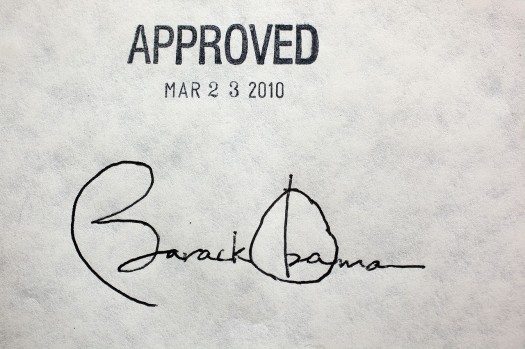

As a writer I bounce from job to job. When not working at LAANE, I have to pay for my own health care – whose monthly premiums, over the past few years, have threatened to surpass my monthly grocery bill. So naturally I was more than glad when the Patient Protection and Affordable Care Act – aka, Obamacare – became law in 2010. I know a bit about what it’s like to have and not have health care. My brother was stricken with a rare form of cancer in his early twenties. He survived against some pretty big odds – but only because of my father’s great health insurance, which allowed my brother to be treated at a leading research hospital. I also lived through the height of San Francisco’s AIDS pandemic and saw what uninsured people went through: days spent in hospital waiting rooms, often minimal care, overcrowded rooms and life-threatening delays for medical procedures.


 As we celebrate Women’s History Month in March, we honor many iconic women workers from past to present, from Rosie the Riveter to Dolores Huerta. But we often forget about the unsung “sheroes,” the women whose toil and dedication help move America, today.
As we celebrate Women’s History Month in March, we honor many iconic women workers from past to present, from Rosie the Riveter to Dolores Huerta. But we often forget about the unsung “sheroes,” the women whose toil and dedication help move America, today.
One such group is the women workers who manufacture America’s buses, trains and streetcars for our public transit systems. Khanthaly Ditthiait is a 26-year-old mom of two who works at a bus factory owned by New Flyer Industries in St. Cloud, Minnesota. When Khanthaly was just 18 years old, she got a job as a painter’s assistant at the factory.
“It was 10 years before they hired any women to paint the buses — I was the first girl that they hired,” she says. “It was like, ‘Oh, you can’t do it, you’re short. And you have boobs.’ But I was determined. I was like,
» Read more about: In Praise of Unsung Women and Their Work »
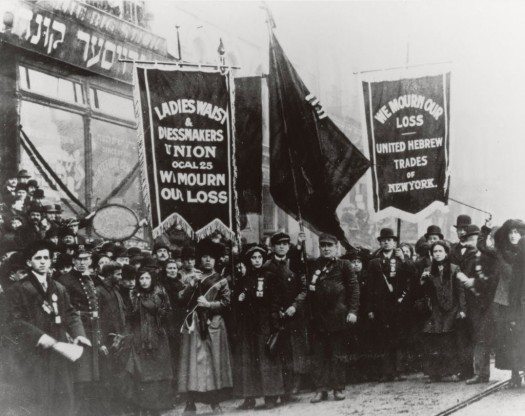
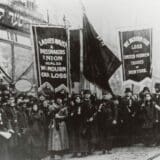
Tuesday is the 103rd anniversary of the Triangle Shirtwaist Factory fire, a major turning point in American labor history. On March 25, 1911, 146 garment workers, most of them Jewish and Italian immigrant girls in their teens and twenties, perished after a fire broke out at the Triangle factory in New York City’s Greenwich Village. Even after the fire, the city’s businesses continued to insist they could regulate themselves, but the deaths clearly demonstrated that companies like Triangle, if left to their own devices, would not concern themselves with their workers’ safety. Despite this business opposition, the public’s response to the fire and to the 146 deaths led to landmark state regulations.
Businesses today, and their allies in Congress and the statehouses, are making the same arguments against government regulation that New York’s business leaders made a century ago. The current hue and cry about “burdensome government regulations”
» Read more about: Remembering the Triangle Fire’s Lessons »


For a long time now, we’ve been a nation of brands. We have our favorite candy bars, sodas, toothpastes and even TV channels. We watch, use and eat “our” brands and leave the others on the shelf. But few of us realize how many of those items we love are actually owned by the same conglomerate – huge financial institutions that consolidate into their systems one product after another.
And often, what we don’t know can hurt our communities. When a handful of companies own all of the most popular brands that Americans use every day, they hold a privileged monopoly on our lives. Capitalism is supposed to offer choice, but more and more the decision is between one huge marketing scheme and another. Capitalism is supposed to foster consumer democracy, but instead it channels our choices into a few mega-corporations that are enriched by our loyalties.
Take media.


 It was a busy time for hard-right politicians visiting the Bay Area this week. First, Kentucky Senator Rand Paul stepped into the lion’s den of Berkeley, where he flashed civil liberties cred by denouncing domestic spying before a University of California audience. He was followed by Texas Governor Rick Perry who, with tax breaks and other incentives, tried to coax some Silicon Valley nabobs into burnishing the “tech” in Texas by relocating there. Although these two Republicans are clearly limbering up for presidential runs in 2016, Perry’s visit got comparatively scant media coverage. One reason may be the perception that Paul, who recently won the Conservative Political Action Conference’s straw poll, is the man on horseback right now while Perry is, well, Rick Perry.
It was a busy time for hard-right politicians visiting the Bay Area this week. First, Kentucky Senator Rand Paul stepped into the lion’s den of Berkeley, where he flashed civil liberties cred by denouncing domestic spying before a University of California audience. He was followed by Texas Governor Rick Perry who, with tax breaks and other incentives, tried to coax some Silicon Valley nabobs into burnishing the “tech” in Texas by relocating there. Although these two Republicans are clearly limbering up for presidential runs in 2016, Perry’s visit got comparatively scant media coverage. One reason may be the perception that Paul, who recently won the Conservative Political Action Conference’s straw poll, is the man on horseback right now while Perry is, well, Rick Perry.
Another reason might be that Perry’s brief visit seemed like a follow-up house call from his widely covered 2013 grand tour, during which he attempted to poach jobs from six states (California,
» Read more about: Rick Perry’s Tall Texas Tales of Job Creation »


The more Miguel Santana forecasts financial apocalypse for Los Angeles, the more the city’s Administrative Officer reminds us of the late Harold Camping, the fundamentalist minister who a few years back predicted the end of the world – erroneously, it turned out, much to the chagrin of disciples who had quit jobs and given away wealth and possessions as they awaited the Rapture.
In a new report issued yesterday by his office, Santana warned L.A.’s leaders against the “temptation” to expand city services, much less think of adding any new ones. And pay raises for city workers? Forget about those. Indeed, Santana recommends cutting entry-level salaries for city workers and raising the health care costs of municipal employees. The reasoning behind Santana’s report is that despite the economic recovery, Los Angeles isn’t out of the woods yet and should only party like it’s 2009 – Year Zero of the Great Recession.
» Read more about: Miguel Santana: Apocalypse Now! (Or Next Year) »
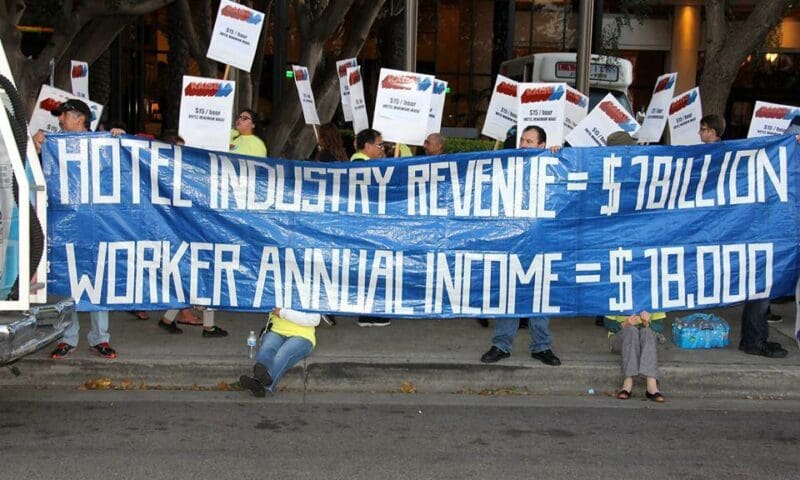
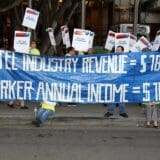
Last week the L.A. Times ran an editorial about the city’s proposed hotel worker minimum wage policy. Given past history—the Times has opposed every local living wage proposal over the past 17 years—it’s natural to see progress in a piece that acknowledges that “persistent poverty” is a “fundamental challenge” and argues that “Creating policies that help lift people out of poverty should be one of government’s top priorities.”
Many have read the Times’ editorial as a call for a broader policy covering more workers, which is a kind of backward endorsement of the Raise LA proposal. In the end, however, the Times stays true to its track record, opposing a $15 minimum wage not only for hotel workers but effectively for others as well.
The point is evident at the bottom of its piece,
» Read more about: L.A. Times’ Double Talk on Raising Wages »


Thirteen years ago Barbara Ehrenreich’s Nickel and Dimed touched off a debate that still rages about the difficulty of low-wage earners – particularly women – to earn a living that merely provides for the basics of existence, let alone its creature comforts. This week the documentary film Paycheck to Paycheck: The Life and Times of Katrina Gilbert continues that debate as it tracks single mother Katrina Gilbert over the course of a year as she tries to pay rent and put food on the table while navigating Tennessee’s social service and health care bureaucracies. If anything, Gilbert’s harrowing story shows how little things have changed for the working- and near-poor since Nickel and Dimed.
One of 42 million American women living on the edge of poverty, Gilbert is a nurse’s aide earning $9.49 an hour in Chattanooga without health care benefits. She suffers from a hyperthyroid condition and is seen deciding which of her many prescriptions she can afford to buy – while also struggling to finish a college education that could lift her living standard beyond the trailer she shares with her three young children.


Beatriz Rios-Nava, 57, has been driving trucks for 10 years. Since starting with a company at the port in Long Beach, she has passed the long hours of waiting in shipping yard queues by taking phone-camera snapshots of her environment: her morning coffee and bread nestled on the dashboard of her truck, her co-workers picketing for unionization outside of their company. Her growing collection of images documenting her life on the piers of Long Beach will be showcased in Solitude to Solidarity, a weeklong group exhibit that runs for the next week. (See information at the end of interview.) I spoke with her at her home in Compton, which she moved into three years ago, hoping to settle somewhere closer to her work. We sat on a black leather sofa in her living room, beneath a hanging dreamcatcher, as she attempted to calm her dog Picasso, who was excitedly bouncing between us.
» Read more about: Beatriz Rios-Nava’s Truck-Driving Odyssey »


There was nothing ordinary about David Koff. Yet Koff – the premier documentarian of L.A.’s epic immigrant worker movement of the 1990s and early 2000s – dedicated much of his life to telling the stories of the dispossessed and voiceless, from Southland hotel housekeepers to Africa’s legions of urban poor.
Koff, who died last week at the age of 74, was a striking figure in every respect, from his long ponytail and immaculately groomed white beard to his singular speaking voice and keen intellect. An Oscar-nominated filmmaker in the first part of his career, he became a legendary labor researcher, media strategist and videographer whose work both captured and helped catalyze the remarkable ascent of L.A. hotel workers as major players in the city’s political transformation.
I first met Koff in the late `90s while working on a state investigation into the Belmont Learning Center, a controversial $200 million project that crumbled under the weight of its own colossal mismanagement – and the brilliant PR work of Koff,
» Read more about: The Cinemagician: Activist Filmmaker David Koff »


I started working at UNITE HERE Local 11 back in 1997. I’ve stayed a part of the labor movement for nearly two decades in no small part because of David Koff, then a researcher with the union, who died last week at age 74.
David was an intellectual and an activist of a kind that’s all too rare these days. He was funny and incredibly smart, and spent the first 30 years of his adult life supporting and making movies about radical international causes.
He took work seriously and was passionate about it, talked too much and made fun of himself. He called our strategy group the Popular Front Organizing Committee and was only half joking. He vowed not to cut his hair till he won a campaign and didn’t. He did construction with a friend of his, doing great work and somehow always alienating everyone by showing up late or not at all.


 Lawmakers in Iowa, Maryland Oregon and Washington advanced legislation to rein in reckless outsourcing of public services to for-profit corporations and private entities. Meanwhile, Minnesota is the latest state to introduce legislation that would keep taxpayers in control of their services by increasing transparency and accountability, bringing the total number of states to 16. And locally, Douglass County, Kansas, passed some of the toughest taxpayer protections against predatory outsourcing in the nation.
Lawmakers in Iowa, Maryland Oregon and Washington advanced legislation to rein in reckless outsourcing of public services to for-profit corporations and private entities. Meanwhile, Minnesota is the latest state to introduce legislation that would keep taxpayers in control of their services by increasing transparency and accountability, bringing the total number of states to 16. And locally, Douglass County, Kansas, passed some of the toughest taxpayer protections against predatory outsourcing in the nation.
“American taxpayers are tired of getting ripped off by corporations that take control of public services and rake in massive profits by cutting corners to public health and safety,” said Donald Cohen, executive director of In the Public Interest Action Fund. “There is a sea change happening and taxpayers are leading the charge.”
In Iowa, SF 2235 passed the full Iowa Senate. SF 2235 would give Iowa taxpayers more power to cancel contracts if for-profit corporations fail to meet performance standards.
» Read more about: States, Counties Move Against Outsourcing »